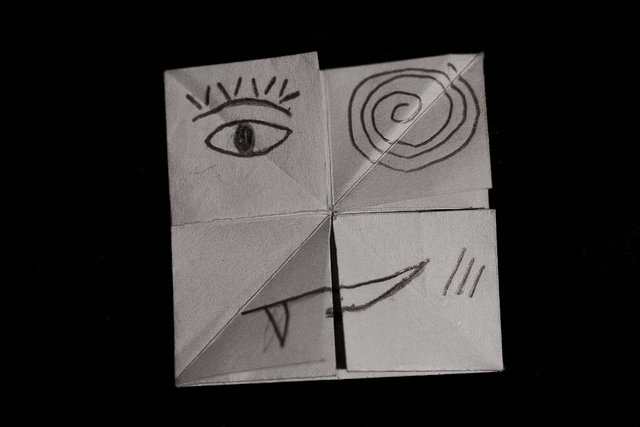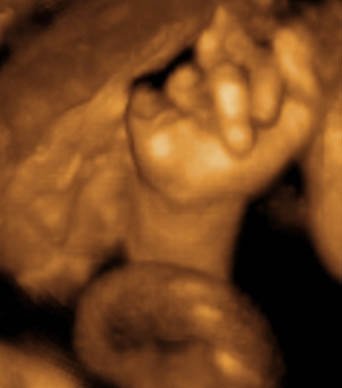
Risa Eccles, thirty-nine weeks pregnant, sat in her car, furious at Dr. LaSalle for being an asshole, at Paul for having the kind of job that made him seem like a degenerate, at herself for thinking that having a baby might be fun. She watched people walking in and out of the clinic. Some of them held crying toddlers; others—mostly elderly—grasped canes, walkers, or other people’s arms. She thought, Everyone who comes here needs something desperately. It reminded her of church.
When she was sure she wouldn’t cry, she called Paul. “The baby’s fine,” she said fast, so he wouldn’t worry about that.
“Wonderful.” She heard relief in his voice and felt heat deep inside: an ember of rage.
She explained how LaSalle said the baby looked great, that she’d be here any day. Asked, “Is your bag packed?” like it might be tonight, even. And then said, “There’s a problem with your blood,” like it was almost nothing, an afterthought.
“What?”
“He said it’s HTLV-1. It causes leukemia. A lot of people in Japan have it. You get it like AIDS.” Just saying “AIDS” made her feel tears under the skin of her face.
“They’re running confirmatory tests,” she added.
“Did you tell him how you’re kind of a hypochondriac? All the doctors, all the tests, and they’ve never picked this up?”
“No. I was in shock.”
“Before me,” he said, “did you ever have a Japanese boyfriend?”
“You’re supposed to take me out to dinner,” she said, after a moment of not saying anything. “To distract me.”
He sighed as though he was clearing his head. “Want to get that pizza?”
Mama Celestina’s Kitchen Sink. If you ate it and could prove you had the baby in twenty-four hours, you got a gallon of homemade red clam sauce.
“Maybe we both need distracting,” he added.
***
Ed and Lori met them at Mama Celestina’s. Ed and Paul had been in a band together a few years before. It folded but they stayed friends. They were both nice like that.
Shouting to be heard over the din of kids and beery talk, Lori rested her forearms on the sticky tabletop and said, “So Sinclair if it’s a girl?”
Risa reached for the bread. “It is a girl.”
Paul nudged her. “Anything?”
“They haven’t even brought the pizza,” she said.
“Yeah, but I thought maybe just the atmosphere. Maybe something in the air.”
Across from him, Ed said, “Maybe all these kids yelling.”
They all nodded, sick of her being pregnant, having to talk about it, waiting for it to be over.
“Quit looking at me,” she said. “It’s not like I’m going to explode.”
Ed brought his beer to his lips. Paul checked his phone for the time—a tic born of a musician’s perpetual tardiness—and ran his fingers through his straight, black hair. He and Ed went back to talking.
“Sinclair could be for a boy,” Lori said.
“Too complicated for a boy. Too fussy. I’d want something plain and short. Mack. Bob.”
“Bob’s a good husband name,” Lori said. “I always thought I’d marry a Bob.”
“Ed’s a good husband name.”
“No, Ed’s the guy who lives next door to your parents and wears Bermuda shorts and black socks,” she said.
Ed looked toward them at the mention of his name and they laughed. Laughing made Risa remember: She might be sick. She might have a terrible disease, or the germ of that disease, inside her. Paul, she realized, hadn’t laughed once all night.
“And has no hair where the socks are,” Lori added after Ed looked away, uninterested.
The waitress arrived and put the pizza on the napkin dispenser. She began to set out plates, then stopped when her eyes met Paul’s. “I know you from somewhere, right?”
She was tall and long-legged, with lush, curly hair and impeccable skin. She was wearing three-inch heels.
Paul smiled. “I don’t know. I’m a musician, so…”
“Ooh,” she said, putting Risa’s plate down, still looking at him.
“I play a lot,” Paul said.
“Are you famous?” the waitress asked, moving around the table, not taking her eyes away. “Like, would I know you?”
Before he could answer, Ed said, “Oh, he’s very well-known. Last month he made the cover of Bay Area Zitherists.”
She giggled, not sure if she were being teased. “You guys.”
“It’s a big industry publication,” Ed said.
“Cut it out already,” Lori said, irritated. To the waitress she said, “He plays drums.”
“Well, anyway,” the waitress said, “I feel like I’ve seen you before.” She set Ed’s plate in front of him, still looking at Paul. “I work the makeup counter at McCullough’s during the day. And you have the greenest eyes. Cosmetologists always remember eyes.”
Risa stared hard at Paul, who was still smiling up at the waitress. “I play around a lot,” he said.
***
They crossed the Benicia Bridge, the Subaru’s tires rumbling over metal. Beneath them hulls of old, deserted ships slept in the dirty delta water. Risa could make out the lights from the C&H sugar plant in Crockett.
“Do you think it’s healthy that they’re our only couple friends?” she asked.
“What?” He sounded weary, not interested.
“I read online that healthy couples are supposed to have several couple friends. You know, where you get together as a group. Instead of just me with my friends and you with yours.”
He wanted to talk about blood, doctors, leukemia. He wanted to run over it again and again, hoping to convince himself there was nothing to worry about.
“Emotionally healthy,” she added.
He sighed. “Where’d you see this?”

“Online. At work.” She handled social media for a psychic healer named Lorraine Beasley, who saw clients and did a weekly spot on local radio. Risa had a lot of time to read.
They rumbled off the bridge onto smooth, purring pavement. “Those articles are full of shit,” Paul said.
After a moment she asked, “So did you know that waitress?”
“Probably not. I see a lot of people.” Pause. “Maybe she looked a little familiar.”
“From where?”
“Maybe a gig.” He signaled right.
“I don’t get how you can’t remember,” she said, conscious of her thighs ballooning against her jeans, her swollen, unfamiliar breasts. The seatbelt was making it hard to breathe. “I remember people I went to junior high with.”
“Maybe I knew her at school.”
“I remember every single person who’s come into Lorraine’s office in six years.”
He eased the car onto the off-ramp. “I just don’t notice that stuff.”
Was this true? Did he not remember people he met in passing? She didn’t know and the realization that together they had made a baby struck her as impossibly foolhardy. What had she been thinking, letting this stranger put himself inside her? It had been impetuous and irresponsible, possibly a punishable act.
A clothing store for big and tall men neared, then slipped behind them.
“I can’t imagine walking around all night in those shoes,” she said, a vain attempt to keep her own rising terror at bay.
“Yeah,” he said. “Most waitresses wear sneakers.”
She thought, So much for not noticing, and unsnapped her seatbelt, which didn’t help at all.
***
Lorraine looked like a middle-school librarian. She was in her early sixties, overly tan, with dyed red hair. She wore a little too much makeup and kept her fingernails a little too long. Once people knew she was a psychic, she looked like one.
“I’m sensing a complication,” she said.
On slow days Lorraine would “read” Risa. She had a disconcerting ability to discern random truths: that Risa spent years in Catholic schools; that her father left her mother for his 24-year-old receptionist; that she met Paul on a crowded BART train; that William Shatner was her first celebrity crush.
She had also been sure that Risa owned a dog and that her grandfather was a locksmith and was unembarrassed when told neither of these things was true. Accountants make mistakes too, she always said.
“What kind of complication?” Risa’s stomach lurched. She hadn’t said anything about her test result.
Lorraine rubbed her temple and blinked rapidly. “Discord,” she said. “I see discord.”
“You mean Paul and me?”
“Disagreement. You two been fighting, honey?”
“It’s a stressful time.”
“Oh, sure it is.” Lorraine went back to rubbing her brow and blinking. “Not disagreement,” she said after a minute. “Honey, you feeling okay?”
“What do you mean?”
“You’re looking a little ashy.”
Risa took a breath, trying to quiet the baby, who’d begun to roll and squirm.
“Secrets,” Lorraine said, looking up, confident. “Secrets.”
“Between Paul and me?” Risa asked, thinking of the waitress, who’d kept her up most of the night. Joanie, her nametag read. She’d remembered sometime after three, feeling at once triumphant and doomed, as though her act of recall was, in and of itself, sufficient evidence against Paul, proof of her own suspicions.
“Secrets. That’s all I’m getting.” Lorraine frowned as if she were encountering radio static. Then she started a little; her fingers flew to her temple. “And something about a test.”
Without thinking, Risa raised her right hand to the shirt sleeve covering her left arm, where they’d taken blood the afternoon before.
“That’s all!” Lorraine beamed a sunny smile.
At the front desk the phone rang. “Back to work!” Lorraine chirped.
Risa could feel her gaze as she half-jogged toward the reception desk.
“You tell that husband of yours to unburden himself,” Lorraine called out. “You tell him this isn’t a time to be keeping things inside.”
***
Risa left Lorraine’s at noon, claiming a headache. Lorraine understood. “Go home and feather your nest, honey,” she cooed.
She drove to McCullough’s. Lumbering up to the doors and pushing, she found herself in the Juniors department, nearly empty except for the sales associate at the register. Craning her neck, she saw the makeup counter in the center of the store.
Joanie was there, adorned in yet another nametag and a white, smock-like apron. In the unforgiving fluorescent light, her skin was pale and flawless, the blush on her cheeks clearly artificial, painted on. She wore flat shoes and thick stockings, like an old-fashioned nun.
“Can I show you something?” she asked, and Risa saw she didn’t remember her from Mama Celestina’s. No surprise: In the restaurant’s dull-orange glow, she had looked only at Paul. To her, Risa had been just another pregnant woman, both hopeful and afraid that the end was near.
“Actually,” Risa said, leaning on the counter, panting a little, “I’d like to get made up.”
Joanie pointed gracefully to the stool—a game-show gesture. “Have a seat.”
After she arranged trays of foundation, mascara, liner, shadow, and blush, an assortment of brushes, and various tubes and bottles, she extended one hand to Risa’s cheek and turned her face with the pads of two delicate fingers. She peered at Risa intently, probably gauging skin tone, but the effect was disheartening: Risa felt as though she was attempting to read her thoughts or ascertain ulterior motives.
“Vanilla, I think,” Joanie finally said with a polite attempt at professional modesty.
“Whatever you think is best.”
Joanie reached for a squat, frosted bottle of foundation and held it, thumb beneath its base, middle finger atop its silver cap. She shook the bottle vigorously as she spoke.
“Pregnancy can alter your natural tones, so you might want to come back sometime after…” Her voice trailed off; she was young and unsure how to refer to birth.
She unscrewed the bottle cap. Risa wanted her to do what she’d grown sick of others doing: ask about names, dates, genders. From those questions she expected to assemble clues and glean information. She wasn’t planning on coming right out and asking what she wanted to know (“Did you ever sleep with my husband?” “Did he use a condom?” “Is there any chance you could have some horrible and rare sexually transmitted disease and not know it?”). She hoped, through idle conversation, to intuit what she wanted to know.
(Lorraine was a great believer in intuition. “God’s whispering,” she would say. “Just listen.” But Risa heard nothing. She was always flying blind, without benefit of divine assistance. She still believed—all that Catholic schooling—but it didn’t feel like belief. It felt like longing.)
“I really want you to put a lot on,” she said. “I want to look like someone else. Someone who would wear a lot of this stuff. Like, if I was going to a wedding. Or if I was in a play.”
“That’s pretty heavy makeup. That’s so they can see you from far away.”
“Yes. Like that.”
Joanie set the bottle cap on one of her trays and tipped the bottle upside down, leaving a perfect, creamy circle of “Vanilla” on the back of her middle fingertip. “I usually strive for a natural look. That’s the most flattering.”
As she worked, she talked: Risa’s skin, she said, was actually quite nice, with small pores. Did she moisturize? Had she noticed any changes during her pregnancy? She had nice eyes; she should consider tweezing.
Finally she sighed and touched Risa’s face, biting her lower lip, concentrating.
“Thanks about the small pores,” Risa said. “I’m not getting that many compliments these days. My husband isn’t into my being pregnant. How it looks.”
“Oh, well,” she said. “You know men.”
“Are you married?”
She shook her head.
“It must be hard, meeting guys at a makeup counter.”
She shrugged, snapping shut a tray of blushes. “I’ve got a boyfriend. He sells computers, makes a lot of money.” She smiled. “Just my type.” She positioned a mirror so Risa could see herself. “You said you wanted a lot,” she cautioned.
Risa gazed at herself: skin tone lost beneath paint and cream, eyes unfamiliar beneath stiff awnings of mascara, lips newly bright and bloated. Her face a shiny distraction from her bulging stomach, forcing attention on itself.
While Joanie rang her up, she heard the voice in her head saying, Please, please, oh God, please. She realized she had been hearing it all along, a faltering prayer at Joanie’s altar, her sacramental ministrations having done nothing to quell her terror, her near-hopelessness.
***
“You look like a clown,” Paul said. “How much did all that cost?”
“It wouldn’t kill you to give me a compliment.”
“I hate all that stuff,” he said. “It’s cheap-looking. Tacky.”
Risa yanked off her jacket and threw it on a chair. “Did it ever occur to you that I was just keeping myself busy? That I needed to distract myself? That maybe I wanted to think about something else besides having some fatal condition?”
“Risa—”
“That, by the way, I didn’t just pick up from getting coughed on.”
He stiffened. “Hey—”
“I mean, has this even occurred to you? That you get it by sexual—”
“Hey! I have never—”
“Well, neither have I!” she screamed. “And the test is always right!”
“Maybe not this time.”
“Always! The doctor said!” Tears coursed down her pasted-on face.
He held out his arms and she went to him, let him fold them over her.
“I would never,” he whispered.
“The doctor said,” she mumbled over and over into his sweater, minding at first that her face must have run off messily into the wool, then not minding at all.
When they finally came apart, she thought, irrationally, that all that makeup was puddling onto the floor, dribbling down her legs, staining her shoes.
They both stared, sniffing back sobs, at the darkening carpet.
“Don’t touch it,” she whispered, the words “bodily fluids” echoing in her head.
“God,” he said, stepping back safely beyond the stain’s slow spread, unaware of her hurting, sorrowful heart.

***
In the labor unit he climbed into bed beside her, careful not to disturb the wires. He spooned himself into place behind her and whispered, “I hate it when we fight.”
“Me too.”
“Please let’s not fight,” he said, kissing her back where the gown didn’t close. “It’s always been only you.”
“I know,” she said.
Mostly she believed him. Mostly, because you couldn’t believe everything. You were an idiot if you believed everything.
Like the technicians who read the sonogram. A girl, they’d said. Definitely a girl.
***
For most of her labor, the nurses ignored her. “It’s your makeup. You’re scaring the shit out of them,” Paul joked early on, and she’d laughed a little, trying not to imagine how she probably looked. Grateful he didn’t mention what they both knew: The nurses were afraid of her tainted, leaking body. But when he brought her a washcloth, she refused to wash her face.
It wasn’t about being seen from far away, as Joanie had assumed. It wasn’t that at all.
Once a nurse brought a note, a message from a woman who asked only that it be delivered as soon as possible. Risa propped herself on one elbow to read it.
“It’s from Lorraine,” she said.
“Why didn’t she text? What’s it say?”
“Her fingernails are too long. Just wishing me luck.” She crumpled the note and tossed it into a wastebasket near the bed.
Actually what it said was, “Not ‘secrets.’ Sequins. Sorry for the confusion, honey.”
It was just like Lorraine to want to clear up anything murky. But the note—her underlined correction—was proof that even she, with her urgent need to be truthful, as well as her psychic link to higher forces, could not be unconditionally believed.
***
Thomas—Tom, for short—was born at 4:14 a.m. Too late for the clam sauce. Risa gave birth in a standard hospital delivery room in which no effort was made to hide the various instruments and machines whose presence signified medical purpose, the imminence of emergency. Undoubtedly it had something to do with the notation on her chart—“possible blood-borne contaminant”—and with the fear in Dr. LaSalle’s eyes as he peered at her from behind his visored mask: a simple precaution, he assured her, designed to protect him from spatters.
***
Lori and Ed hung out in the waiting room until midnight. Lori stayed longer, well after Ed left, pleading exhaustion. She told Risa this on the day she and Tom came home, and they laughed at men’s squeamish fear of mucus and hospitals, their tender sensibilities.
“I don’t know what he was rushing off for,” Lori said. “He’s got the worst insomnia.”
Risa knew about Ed’s insomnia. She had seen it for herself on a night three years before.
“Like the princess and the fucking pea,” Lori said, laughing.
Risa didn’t remember anymore the stories they’d concocted for Paul and Lori, how they managed to orchestrate a few hours alone at the Highland Motel, with its scummy, leaf-strewn pool and tattered marquee advertising hourly rates. Ed had fallen asleep after hours of sex but kept jerking awake, unable to relax. He said it was a chronic problem, unrelated to their doings.
It had been a reckless mistake: the result of immaturity, restlessness, a hankering for something unnameable. She and Ed agreed to pretend it never happened. Now, sometimes, she felt she’d dreamed it.
Risa’s phone rang. It was Dr. LaSalle, happy to report the confirmatory tests were negative, indicating no presence of HTLV-1. Hormones related to pregnancy—“raging,” the doctor described them—had thrown the initial blood test off.
“But you said the test was never wrong,” Risa said.
“Never say never,” he said, jovial, relieved.
“So I can nurse now?” In the hospital they’d told her not to; the virus would be in her milk.
“By all means,” he said.
Lori shook her head as Risa hung up. “Assholes. They tell you something like it’s true, like they really know. And they’re full of shit.”
She hugged Risa good‑bye and kissed Tom’s splotchy forehead. When the front door closed, Risa pulled open her blouse. Engulfed in relief and joy, she felt fear too. What if the doctor was wrong again? What if he’d read the wrong report? What if a lab technician had confused one vial of blood with another?
Belief, she found, was hard to come by.
As she nursed, she heard Paul open the kitchen door, set bags on the counter.
“The tests are okay,” she called.
Silence. She imagined him drenched in relief, chilled to the bone with it.

Then he appeared in the doorway, a jar of peanut butter in one hand. “You want lunch?”
Lorraine had said “secrets” first. Paul had them and would keep them to himself. As Risa would keep hers. She didn’t need a psychic to tell her that.
But—and this was the funny thing—even months later, she still looked for sequins. She looked everywhere, hoping against all odds they would turn up, a shimmering reward for faith.

Share this post with your friends.

